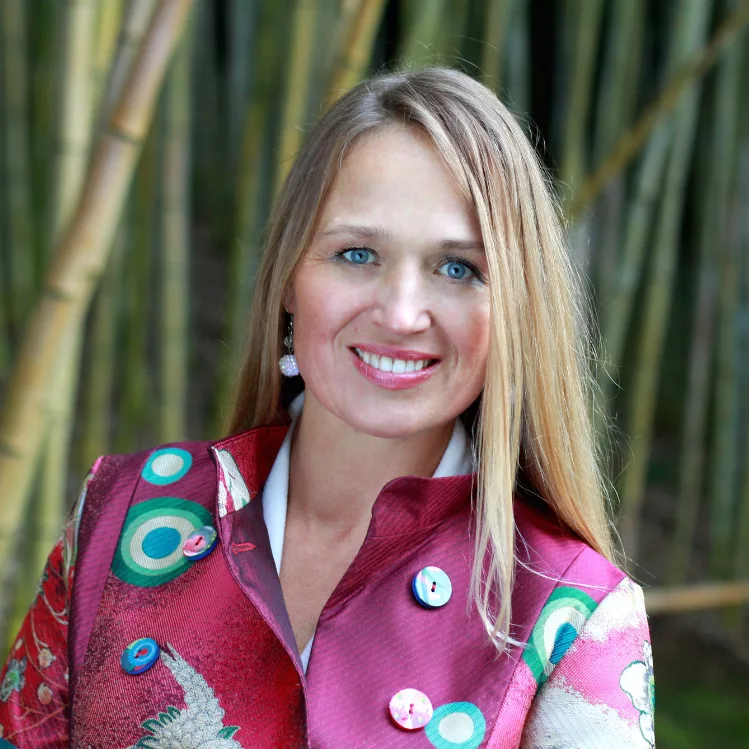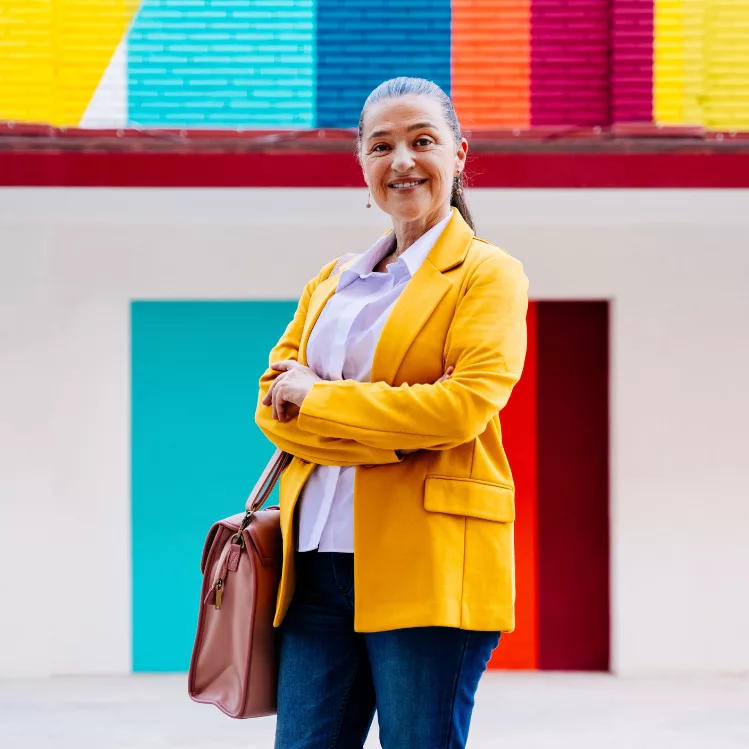
Trust your intuition: Feng Shui is as much an art as it is a science – Aelita Leto
These are words I live by. I am Aelita Leto, a Feng Shui Master, classically trained and a graduate from the Temple of Change and Transformation as a Doctor of Chinese Energetic Medicine. My expertise includes Daoist Healing, Medical Qigong Therapy, Spiritual Transformation Training and healing protocols. I also have extensive training in classical Feng Shui and Chinese Astrology, as an important collaboration when I consult on exterior and interior design. In this piece, I’m going to tell you how I have evolved in my Feng Shui practice, what my passions are and life purpose.
What initially drew you to Feng Shui, and how has my practice evolved over the past three decades?
From a young age, I was fascinated by the harmony and balance found in nature. I often felt a deep connection to the natural world around me. This innate curiosity led me to explore various philosophies and teachings that honored the interconnectedness of our environment and personal well-being. When I discovered Feng Shui, it profoundly resonated with me. Feng Shui embodies the art of balancing energies within spaces to foster health, prosperity, and happiness.
Initially, I focused on mastering the intricate principles of classical Feng Shui and Chinese Astrology. As I learned more, I pursued a formal education, culminating in a Doctorate in Chinese Energetic Medicine. This expanded my practice to include Daoist Healing and Medical Qigong Therapy. This allows me to integrate a holistic approach to healing and transformation.
I combine my expertise in Feng Shui with my knowledge of energetic medicine and design to create environments that not only look aesthetically pleasing but also promote spiritual growth and transformational healing. My journey is driven by a passion to help others achieve balance and harmony in their lives through the power of Feng Shui and energetic practices.
How do you tailor your consultations for different types of clients, from private to large businesses and public organizations?
Each client is unique. Each brings their own set of goals, challenges, and environments. Because of these factors, each necessitates a distinctly personalized approach. For homeowners, my focus is on creating a deeply personal experience. I start by understanding their aspirations and challenges, whether they seek enhanced health, improved relationships, or greater prosperity. Using my expertise in Feng Shui and Chinese Astrology, I design tailored solutions that align the energy of their living spaces with their qi. This helps foster a harmonious and supportive environment.
When working with businesses and public organizations, the scale and nature of the consultation shift. I take into account the larger dynamics at play. They include team interactions, organizational objectives, and the need for optimized workflow and productivity. My approach combines Feng Shui with strategic design principles to enhance the flow of energy within the workspace, thereby supporting the organization’s vision and promoting a positive atmosphere that encourages creativity and collaboration.
For every client, whether an individual or a business/corporation, I make sure my consultations are results-oriented, respectful of their unique circumstances, and aligned with their desired outcomes. This dedication to a personalized and attentive service ensures that everyone benefits from the balanced and harmonious environments we create.
Having completed nearly 10,000 consultations across the US and Europe, could you share a particularly memorable or transformative Feng Shui project that deeply impacted you or your client?
One of the most transformative projects I had the privilege to work on was with a family-owned business in Santa Cruz, California. They were struggling with stagnant growth and financial instability. The owners were passionate about their craft, but despite their efforts, they couldn’t seem to build momentum to expand.
When I first visited their workspace, it was evident that the flow of energy was blocked by clutter and poorly arranged elements. This contributed to a sense of disarray and hindered productivity. I proposed a comprehensive Feng Shui makeover. This included focusing on decluttering, reorienting furniture to enhance the chi flow, and incorporating specific colors and elements to stimulate abundance and creativity. We repainted a single accent wall to create a pivotal experience by rearranging the remaining areas.
The results were remarkable. Within months, the business saw not only financial growth but also an improved workplace atmosphere. Employees reported feeling more motivated and energetic, and customers responded positively to the changes. The owners expressed deep gratitude, stating that the Feng Shui transformation had revitalized their business and personal lives.
This project highlighted the profound impact that a harmonized environment can have on success and well-being. It was a deeply rewarding experience for both my clients and me, reinforcing my dedication to helping others achieve transformational results through the art of Feng Shui.
Feng Shui is rooted in ancient Chinese philosophies. How do you balance these traditional practices with the modern architectural and interior design trends you encounter in your consultations?
Balancing the timeless principles of Feng Shui with contemporary design trends is both a challenge and an exciting opportunity. While every consultation includes Feng Shui, which is rooted in ancient wisdom, its application is versatile and adaptable to modern living spaces.
I focus on the positive and what is “GOOD“ in the existing space, not on pathology or just looking at what is wrong, or proving what’s wrong that most practitioners nowadays focus on. Instead, identify what is good and make it better. If we find imperfections, a solution to neutralize and make it good.
The other important thing is to help create a deal that you LOVE your home, and in return, any house becomes HOME.
To achieve this balance, I focus on the core intention of Feng Shui—creating harmonious environments that support well-being and prosperity. This allows me to work within the framework of modern design while maintaining the essence of traditional practices. For instance, I integrate Feng Shui concepts like the flow of energy and the five elements into current architectural layouts and interior styles, ensuring that the space reflects both aesthetic appeal and energetic balance while staying practical.
In practice, this might mean advising on the strategic placement of furniture or incorporating natural elements to enhance the chi flow, while also respecting a client’s personal taste and contemporary design preferences. I stay informed about new materials and technologies that align with sustainable and harmonious living, intertwining them seamlessly with classical Feng Shui principles.
Ultimately, the goal is to honor the integrity of Feng Shui while embracing the innovations of modern design, resulting in spaces that are both beautiful and energetically nourishing. Feng Shui is the ART and Science in one.
As a mentor and teacher at the Golden Gate Feng Shui School for 10 years, what are the most important skills and insights you emphasize to the next generation of Feng Shui consultants?
In my role as a mentor and teacher, I emphasize a holistic understanding and application of Feng Shui, focusing on both its traditional roots and its practical application in modern settings. One of the most important skills is the ability to deeply listen to spaces, to energies, and clients. This insight helps consultants accurately assess environments and intuitively identify imbalances. IMPORTANT: seek and recognize what is good feng shui and make it better -enhance the existing before you seek imperfections and create fear (a lot of consultants run fear-based practices that I find unethical and lack of creativity )
Understanding and associative thinking are crucial. As an expert in feng shui, it is important to practice experience at all times. Mastery in feng shui is when your advice is connected to practical experience, intuition and knowledge = in such cases it becomes WISDOM.
Another key focus is ethical practice and authenticity. I encourage aspiring consultants to work with integrity and compassion, always prioritizing the well-being of their clients. Developing a personal style that reflects their values and strengths is also crucial in building a successful practice.
Furthermore, I promote continuous education and self-reflection. The field of Feng Shui, like energy itself, is dynamic and ever-evolving. Staying informed about new research and trends helps consultants provide the most effective and relevant guidance.
Ultimately, my goal is to inspire and equip students with the confidence and knowledge they need to make a positive impact on the world through the transformative art of Feng Shui.
As my teacher motivates, try to leave the place better than you found it!
You regularly take sabbaticals to study with renowned masters across Asia. What are some of the key lessons or philosophies you’ve learned from these experiences that have further enhanced your practice?
My sabbaticals across Asia have been incredibly enriching, offering deep insights and profound lessons that continuously enhance my practice. One of the most significant philosophies I’ve embraced is the concept of “flow”—both in nature and in life. Renowned masters taught me that true harmony comes from understanding the natural rhythms of energy and incorporating these flows into our surroundings and daily routines. Associative thinking is most important.
Another key lesson is the importance of mindfulness and presence. In studying practices like Daoist Meditation and Medical Qigong, I’ve learned that being fully present allows us to connect deeply with both the environment and the individuals we serve. This connection is essential for creating spaces that truly resonate with and support the people who inhabit them.
I’ve also gained a deeper appreciation of what is Balance :: in the west, you might think it is 50/50, but in Chinese for the balance of yin and yang 70/30, which has strengthened my ability to diagnose and remedy energetic imbalances in modern spaces. This understanding allows me to offer more nuanced and tailored solutions to my clients.
Moreover, these experiences reaffirm the idea that continuous learning and humility are vital for personal and professional growth. Each master brings unique wisdom that challenges me to broaden my perspective and refine my approach.
These travels and studies are integral to my journey as a Feng Shui practitioner, fueling my passion and equipping me with a rich tapestry of knowledge that I bring back to my clients and students.
Feng Shui often involves understanding the energy flow in physical spaces. Can you describe how you approach assessing a new space and identifying areas that need improvement or balance?
When assessing a new space, the approach is both methodical and intuitive. We begin with a thorough walkthrough, observing the layout, decor, and existing energy patterns. This initial examination allows me to perceive the space’s overall chi flow and note any immediate areas of congestion or imbalance.
I then apply classical Feng Shui tools, such as the take compass reading with Lupon compass ( Feng Shui Compass) using the Bagua map, to evaluate how different areas of the space align with the life aspects (like health, wealth, and relationships). This helps pinpoint specific zones that may need enhancement or adjustment.
In addition to these structured techniques, I rely heavily on intuition and energetic sensitivity, which are crucial in identifying subtle imbalances not immediately visible. I take into account the natural elements present (wood, fire, earth, metal, and water) and assess how harmoniously they’re integrated into the environment.
Client interaction is also a pivotal component of my assessment. Understanding the client’s intentions and experiences within the space is essential for creating solutions that resonate personally and effectively with them.
Once the assessment is complete, I propose tailored recommendations, such as rearranging furniture to optimize energy flow, introducing elements that may be lacking, or adjusting lighting and color schemes. Each suggestion is aimed at fostering a balanced, vibrant environment that supports the well-being and aspirations of those who inhabit the space.
Your consultancy has grown primarily through word of mouth over the years. What do you think are the core reasons for your client’s loyalty and the strong reputation you’ve built in the field?
The foundation of my consultancy’s growth and the loyalty of my clients rests on a commitment to authenticity, personalized service, and impactful results. From the outset, my approach has been centered on deeply understanding each client’s unique needs and aspirations. This personalized attention ensures that the recommendations I provide are not just theoretical but practically enhance their lives and spaces in meaningful ways.
Transparency and trust are also paramount. I foster open communication with my clients, explaining the principles of Feng Shui and how they apply to their specific situations. This education empowers them with knowledge, enabling them to understand and appreciate the recommendations I make.
My dedication to continuous learning and integration of the latest insights from my studies with renowned masters across Asia enhances the breadth and depth of my practice, keeping it relevant and effective. Clients appreciate this dedication to expertise and often feel confident in referring me to others based on their positive experiences.
Additionally, the genuine care and compassion I bring to each consultation cultivate strong, lasting relationships. I view my work not just as a series of projects but as part of a larger journey to improve the lives of those I serve. Clients recognize and value this authentic commitment, which naturally results in word-of-mouth growth and a strong reputation within the Feng Shui community and beyond.
What advice would you give to someone new to Feng Shui and interested in applying its principles in their home or workspace for the first time?
For those new to Feng Shui, I recommend starting with simple, impactful changes that can transform your space and enhance your well-being. Begin by decluttering your environment. Clutter not only blocks the flow of energy but can also lead to feelings of stress and chaos. Creating a clean, open space allows for the natural movement of chi, which is vital for harmony and balance.
Next, focus on introducing the five elements—wood, fire, earth, metal, and water—into your space and maintaining appropriate balance. Each element brings different qualities and energies. You can incorporate them through colors, materials, or symbolic representations, adding balance and vitality to your environment.
Pay attention to the lighting and air quality in your space. Natural light and fresh air are essential for a vibrant and healthy environment. Consider using plants, which not only improve air quality but also introduce a calming natural element.
Finally, take time to understand the Bagua map, a fundamental tool in Feng Shui. It’s a grid that reflects different life aspects mapped over your living or work areas. Start by aligning the Bagua map with your space, helping you identify areas that correspond to aspects like career, health, and relationships. Enhancements in these areas can positively influence your life.
Above all, trust your intuition. Feng Shui is as much an art as it is a science. Experiment with what feels right to you and observe how changes impact your space and well-being. By taking these initial steps, you’ll start creating an environment that supports your goals and enriches your daily life.






